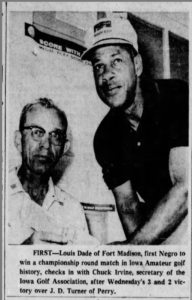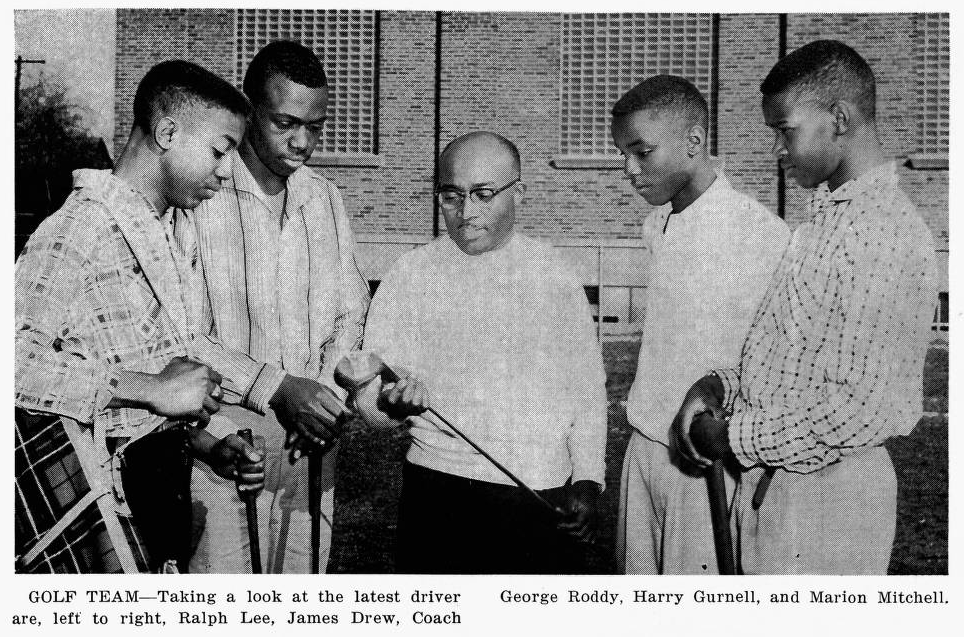Louis Dade – An Iowa golf legacy many don’t know
 The following feature on Louis Dade was written by 11-time Iowa Sportswriter of the Year Rick Brown and shared recently with Iowa Golf Association. The legacy of Louis Dade continues the celebration of Black History Month, an annual celebration of achievements by African Americans and a time for recognizing their central role in U.S. history.
The following feature on Louis Dade was written by 11-time Iowa Sportswriter of the Year Rick Brown and shared recently with Iowa Golf Association. The legacy of Louis Dade continues the celebration of Black History Month, an annual celebration of achievements by African Americans and a time for recognizing their central role in U.S. history.
There’s a conference room named for Louis Dade at the African American Museum of Iowa in Cedar Rapids.
It is a fitting honor for an unassuming man with a golfing legacy many don’t know.
To appreciate Dade’s golfing accomplishments, which include becoming the first African American to reach match play in an Iowa Amateur Championship, you need to follow the path he took to reach the golf course.
Louis Dade was born and raised in Canton, Mo., and dropped out of school before he finished the eighth grade. Segregated schools ended in Canton after the eighth grade, and youngsters like Dade had to travel to Hannibal, Mo., some 40 miles away, to continue their education.
He worked odd jobs for several years, then moved with a cousin to Fort Madison in 1927, when he was 17 years old. His cousin left soon after, but Dade stayed. He had an assortment of jobs at the Anthes Hotel, including shining shoes and working as a bellhop.
He got married in 1928, and another life-changing moment came shortly after. He was hired by W.A. Sheaffer, whose well-known pen company is a significant part of Fort Madison history.
Dade worked for the Sheaffer family as a chauffeur, butler and later a caretaker.
“I took care of the cars, vacuumed, waxed the floors, whatever needed to be done,” Dade told the Fort Madison Daily Democrat in 2003.
Sheaffer was a golfer, and built an indoor driving range in the basement of his home.
“I’d been with the Sheaffer family for a little while, but not too long, when (Sheaffer) put the driving range in the basement,” Dade said. “This is the first time I connected with golf.”
Dade was not allowed to play the golf course in Fort Madison, where Sheaffer played, but golf help bond the two men.
“W.A. would come home from the pen factory and we’d hit balls in the basement,” Dade said. “He really got me interested in golf, and a few years later I taught the first golf lesson in Fort Madison.”
Dade left Fort Madison around World War I, taking jobs at Wisconsin Steel in Chicago and then Douglass Aircraft in Santa Monica, Calif. A member of the Sheaffer family called Dade and asked him to return to Fort Madison to care for W.H. Sheaffer and his wife. W.H. passed away in 1946, and his wife in 1961.
The Sheaffer family created a trust fund for Dade when he worked for them, which gave him financial security for his loyalty and good care.
“I was very fortunate,” Dade said. “They gave me a chance to have a great life.”
Dade’s golf game was in full swing the1950s. He honed his game at Flint Hills in Burlington, as well as courses in Fairfield, Muscatine, Keokuk, Ottumwa and Quincy, Ill. He also played golf in California when he drove the Sheaffers there over the winters.
Dade said that several people in Fort Madison, including golf pro and Iowa Golf Hall of Fame member Bob Fry, told him he should try his luck in an Iowa Amateur. Fry also spent time as Dade’s instructor.
Dade started playing in the Iowa Amateur in 1954. The championship was contested by match play back then, switching to medal play in 1960. Dade would take vacation every summer to play in the state’s most prestigious amateur championship.
He failed to qualify for match play in his first four attempts, though he did have success elsewhere. Dade won the 1956 Southeast Iowa Amateur. His Iowa Amateur breakthrough came in 1958 at the Fort Dodge Country Club. Dade qualified with an 80, and found himself in a nine-man playoff for the last three spots. Dade made a long putt on the first extra hole and advanced.
Dade’s first-round match was equally memorable, beating Iowa Golf Hall of Famer J.D. Turner, 3 and 2. Dade’s picture, posing with Iowa Golf Association secretary Chuck Irvine, was on the front page of the Des Moines Register’s Big Peach sports section the next day (shown above).
The cutline to the picture read, “Louis Dade of Fort Madison, first Negro to win a championship round match in Iowa Amateur golf history, checks with Chuck Irvine, secretary of the Iowa Golf Association, after Wednesday’s 3 and 2 victory over J.D. Turner of Perry.”
Dade bowed out in the second round to Bill Hird, Jr. of Fort Dodge, 4 and 2, but it was a memory he carried proudly for the rest of his life.
“I’ve never been treated better,” Dade told Bert McGrane of the Des Moines Register. “Jack Rule, Bill Hird, John Liechty, Herb Klontz and some of the others treated me like I was one of the group.”
Dade always appreciated his experience of playing in the Iowa Amateur.
“I don’t want any better treatment than I get,” he said.
After his responsibilities with the Sheaffer family ended, Dade would spent his winters in Arizona and his summers teaching golf in Iowa at places like Spring Lake in Fort Madison, Mount Pleasant Country Club, New London and Flint Hills in Burlington.
One of his pupils was 14-year-old Todd Hamilton, who grew up in Oquawka, Ill., across the Mississippi River from Keokuk. Hamilton would go on to win the 2004 British Open.
On the course, Dade was shooting his age well into his 80s. He shot an 80 to win a senior tournament in Wapello when he was 82.
Dade was 88 when retired from teaching in 1996.He was 100 years old when he passed away on Oct. 22, 2008.
Five years before he passed, Dade and the Sheaffer Foundation donated $10,000 to the African American Museum of Iowa. And a conference room was named for him, complete with a photo exhibit of his private life and golf career.
“It’s quite an honor,” Dade said then. “I’m really pleased with that. I came here from Missouri back when I was 17, I didn’t have a high school or college education and I just wanted the chance to work.”
He also became a golfing trailblazer.




